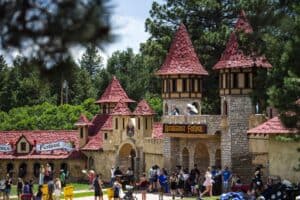As access to water in the West becomes an increasing concern, one Black Forest group fears the acquisition of rights to the Dawson aquifer by an outside water company will force Black Forest residents to face the possibility of water shortages; or, worse, dry wells ñ sooner, rather than later.Friends of the Black Forest Preservation Plan have raised concerns about Cherokee Metropolitan Districtís rights to extract water from the Dawson aquifer, which already provides hundreds of Black Forest residents with water, and the possible impact on proposed private wells in the future Flying Horse North development.Developed and built by Classic Homes, the Flying Horse North development is a proposed 1,417-acre 283-lot development that would border Black Forest Road on the east and Hodgen Road to the north. The luxury home development could also include amenities like an 18-hole golf course and clubhouse.The stateís water court granted Cherokee Metropolitan District a series of adjudicated water rights acquisitions between 2011 and 2013, allowing the district to draw water from four aquifers that extend below areas of Black Forest, as well as the Flying Horse North development, according to a March 5 article, îColorado Springs real estate company looks to bring its Flying Horse concept to Black Forest,î written by Rich Laden and published in the Colorado Springs Gazette March 5.Cherokee provides water to about 17,945 customers in its roughly 6,300-acre service area, including residents in Cimarron Hills, portions of Falcon, Schriever Air Force Base and other areas 20 miles east of the main district boundaries near Ellicott.Now, Cherokee will also provide water to Flying Horse North residents and have rights to pump from the Dawson, the shallowest of the four aquifers that comprise the underground Denver Basin, said Black Forest Land Use Committee Chairman Terry Stokka.ìThey have rights to pump huge amounts of water. We feel this could very easily impact individual wells,î Stokka said.Black Forest residents believe the water in the Dawson should be kept for Black Forest use, rather than pumped and provided to customers several miles away, he said.However, Kurt Schlegel, Cherokee Metropolitan District interim general manager, said that belief is a misconception about Colorado water laws.ìColorado water laws are very complex, but there is no law that states a certain amount of water under a certain amount of property should stay there,î Schlegel said.The biggest concern for Black Forest residents is the possibility that Cherokeeís use of water from the Dawson could drain the aquifer enough to where Black Forest residents would experience disruptions in water service or see the wells run dry, Stokka said. ìIf wells run dry, itís going to cost anywhere from $15,000 to $20,000 each to drill new wells,î he said.Leif Garrison, president of the Friends of the Black Forest Preservation Plan, said Black Forest residents would bear the cost to drill new wells. It would be a significant burden, Garrison said.ìThe Dawson aquifer is not renewable, and a lot of Black Forest residents donít have access to renewable water … there are no funds set aside to re-drill or deepen wells to get back down to where water levels are,î he said.Adding more than 200 homes in Flying Horse North to Cherokeeís service area would only exacerbate the possibility of water shortages for Black Forest residents, Stokka said.ìUsing the normal 5-acre average for each residential lot, one 1,000-acre area where the Cherokee wells are sited would contain 200 homes and 200 individual wells. If Cherokee pumps their allotted water from the Dawson aquifer, the water taken from the Dawson would equate to 2,100 homes, a tenfold increase,î Stokka said.Stokka also said dry wells can impact property values.Schlegel said to his knowledge no studies have been done by Cherokee Metropolitan District on the impact of taking water from the Dawson to service the Flying Horse North development. ìAny time you pull water out, depending on the water flow and the rate at which the water is being pulled out, there is always concern when itís drawn from a non-renewable resource,î Schlegel said. ìWater is a property, and each landowner has a right to do with their water as they see fit. We want people to exercise their water rights, and it is true that if water supplies are in jeopardy it will adversely affect property values.îCraig Dossey, executive director of El Paso County Development Services, said it is difficult to tell exactly how much water is in an aquifer at any given time.ìEven the most experienced hydrogeologists would disagree on how much water is in the aquifers … no one really knows,î Dossey said. ìThe amount of water available hinges on how fast these aquifers recharge. We canít say with certainty how fast the wells are recharging.îBut Schlegel said that the water rights adjudicated to Cherokee by the state provided proof there is enough water to support the Flying Horse North project, as well as Black Forest residents and other customers in Cherokeeís district. Had there not been sufficient water levels to support its customers, Cherokee would not have been granted the water rights to the Dawson, said Schlegel.Garrison disagreed: ìI donít think that assessment comports with my understanding of the way water law works.î Stokka said the Friends of the Black Forest Preservation Plan are planning to work with lawyers and hydrogeologists to create a groundwater model of the area to show how the Dawson will be impacted if Cherokee chooses to exercise its rights to pump water from the aquifer.Schlegel said Cherokee is looking for a longer-range solution to water service in the area, and is working on a water renewable source plan.ìThe idea is to use as little water from the Dawson as possible. The Dawson would be an alternate water source,î Schlegel said.Currently in the engineering stages, Schlegel said Cherokee is considering several options for water renewable sources, such as purchasing water from Southern Colorado and depositing it into a reservoir in Fountain, then transferring that water to the district through its pipeline.The water renewable sources would be implemented within the next four to five years, with a total build-out of 10 to 12 years.ìThis is all under direction from the (Colorado Division of Water Resources),î Schlegel said.Garrison said Cherokeeís plan to use water renewable sources is good news to concerned Black Forest residents.ìWe appreciate the friendliness from Cherokee … the situation that we see with this high-level (water) pumping is unprecedented. Weíre very hopeful that alternative usages for Cherokee are not the Dawson aquifer,î Garrison said.Dossey said Cherokeeís water rights to the aquifers has been a ìcontentious issue,î and he is not surprised it has remained that way. ìAs development continues in Black Forest, water may continue to be an issue even more than it is now,î Dossey said.Schlegel said it is Cherokeeís intention to create amenable relationships with its customers and local organizations.ìWeíre all pulling from the same resources, and we want to work with our neighbors and partners to work in a responsible manner,î Schlegel said. ìWe want to maintain water resources and property values; and we want to be good neighbors who provide excellent service to our customers.







